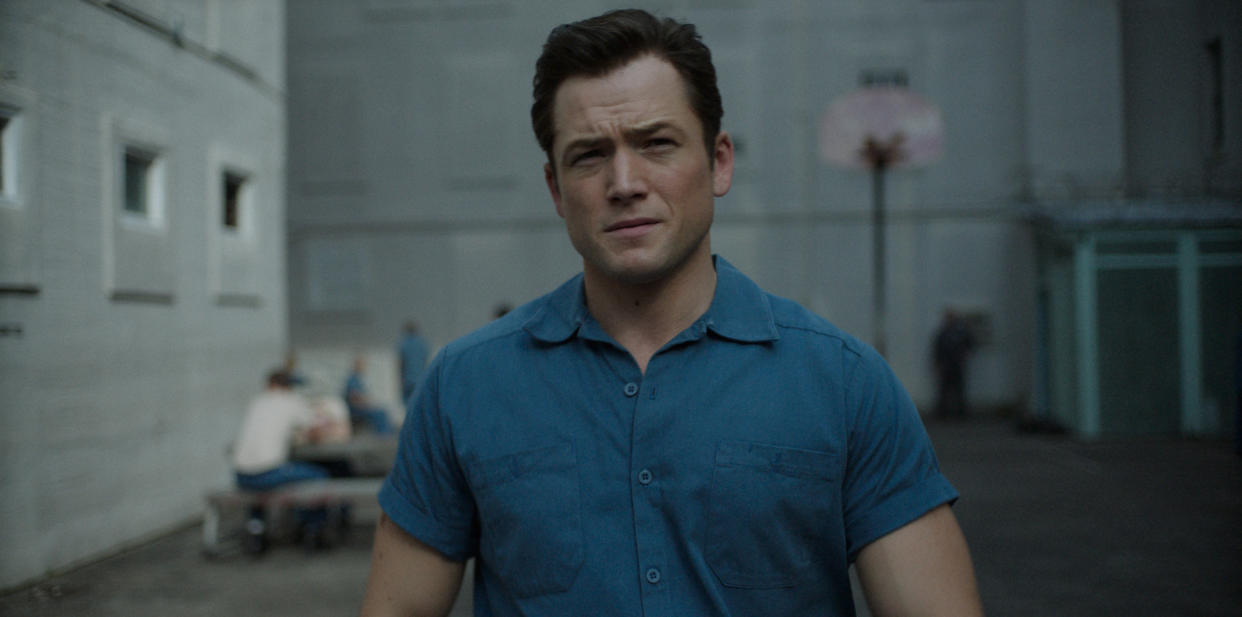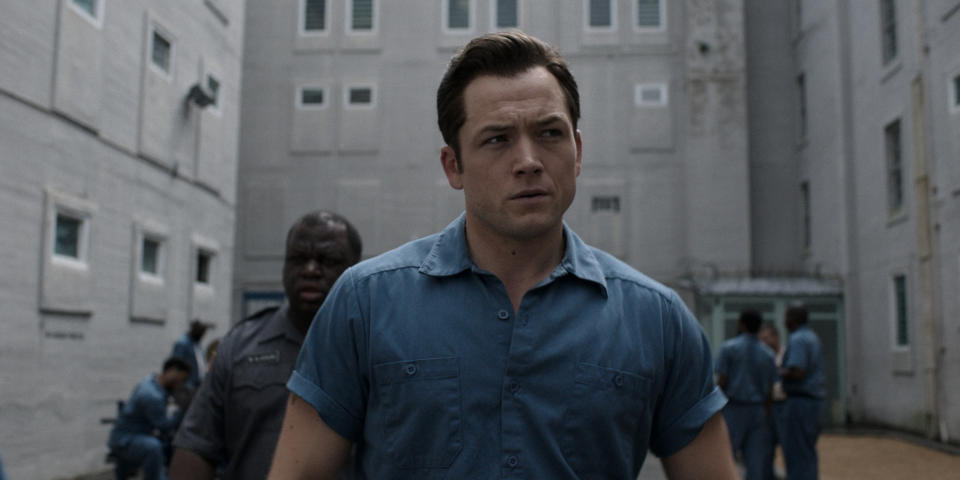Taron Egerton Explains Surprise at ‘Black Bird’ Finale Fight: ‘It Was All Up for Grabs’

- Oops!Something went wrong.Please try again later.
Watching “Black Bird” over the last six weeks has been like watching a MasterClass in acting, writing, and toxic masculinity. It’s that last element that was specifically why author and series creator Dennis Lehane wanted to tackle the series in the first place. “I said, I would do this story if I could make it about misogyny. I would do the story if I could make it about the male gaze,” Lehane told IndieWire via Zoom. And the series has certainly done that, crafting a brutal tale about a serial killer, expertly played by Paul Walter Hauser, and the cocky drug dealer turned informant (Taron Egerton) intent on bringing him down.
The show has always been about the dynamic between Hauser’s Larry Hall and Egerton’s Jimmy Keene as they try to suss out each other’s motivations. But with the finale, “You Promised,” Jimmy has to get a confession from Larry by any means necessary. Filming the confrontation between the pair wasn’t something Egerton felt comfortable showing up casual for. “Paul and I had discussed it at length,” Egerton said to IndieWire in a separate conversation. “We didn’t know what was going to happen. We didn’t know what the physical elements of it would be like. We didn’t know if it was going to be a fight between us. It was all up for grabs.”
More from IndieWire
'Black Bird' S1 Finale Review: 'You Promised' Unleashes Inner Anguish
'Ted Lasso': Toheeb Jimoh Wanted to Do His Part for Nigeria Through Sam's Decisions
While the actor has starred in several action movies, Egerton wanted to go simple. “What is the story that we’re telling with this moment of violence?” he said. Egerton campaigned heavily for Jimmy to be defenseless opposite Larry, culminating with Jimmy being slammed against a wall. “I felt for the storytelling [that] Jimmy should be robbed of any strength that he has,” said Egerton. It’s the moment the audience sees the perceived meek and mild Larry for the true monster that he is. Egerton said Hauser got so into the moment that his shouts to Egerton’s character as Jimmy is escorted out of the room were all improvised.
Like Lehane, Egerton also wanted an opportunity to showcase the series themes of misogyny and violence against women. Egerton suggested was having the camera spin and place Jimmy underneath Larry. “My idea was for that was I felt Jimmy, at that moment, needed to feel what it felt like to be Jessica Roach and Tricia Reitler,” he said. “You feel him [Jimmy] be overpowered.”
It’s certainly a far cry from where Jimmy Keene started the series. Egerton said he broke down reading the finale script, particularly during the moment when Jimmy, trapped in solitary confinement, begs the guard for a pen and paper to draw out a map “before I’m of no use.” Hearing that scene brought the actor back to the series’ beginning when he questioned whether he could sustain playing a character so insufferable. “The challenge of the role is he’s such a fucking insufferable pig in the first episode. Can I keep him with me for this long?” he said.

Apple TV+
The darkness of the storytelling and the characters challenged everyone associated with the project. Hauser admitted during a previous IndieWire interview that playing Larry Hall compelled him to get sober. Lehane said he apologized to his daughter for being difficult to live with while he worked on the series. Egerton, interestingly, felt the series allowed him an opportunity to get away from his own struggles in life. “I was in New Orleans for six and a half, seven moments. I didn’t see my family. I had just been through a breakup,” he said. “I was ready to throw myself into this creative experience, and when it was done it was almost like the illusion shattered and my own life came rushing through the cracks again. So I didn’t really have much of a choice.”
The series caused everyone to reevaluate their own relationships with women. Lehane points to Egerton’s first scene opposite Sepideh Moafi as something drawn from his own life. “Somebody said to me in my 20s, ‘What do you like about women,’ and I remember trying to describe it and seeing the look in this woman’s eyes, who was probably in her 40s,” said Lehane. “Everything I said was such a cliché, it was so embarrassing. Now…I just go, ‘Oh, she was getting you to see that you don’t really see women. You just see dolls, you see swimsuit models, you see prettiness. You don’t see a person.”
Though Lehane doesn’t want to be timely with his series, he points out that the current times are causing creatives to cast an eye even more on toxic masculinity. Part of the reason why the finale episode is titled “You Promised” is because of this unspecific promise he sees men in this country falling back on. “There’s a whole bunch of people walking around who think they’re entitled to something, and think there was a promise given to them that they can’t even define and that they are owed. They are owed by women. They are owed by the government. And they are owed by everybody who’s not white,” said Lehane.
“Black Bird” is streaming now on Apple TV+.
Best of IndieWire
Charlie Cox and Vincent D'Onofrio Set to Reprise 'Daredevil' Roles for Marvel Series 'Echo'
'The Last of Us': Everything You Need to Know About HBO's Adaptation
‘The Lord of the Rings’: Everything You Need to Know About Amazon’s Big Money Adaptation
Sign up for Indiewire's Newsletter. For the latest news, follow us on Facebook, Twitter, and Instagram.

